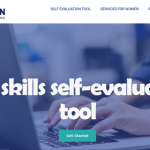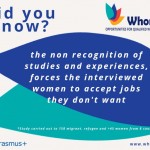
 This platform, developed by the Italian partner COSPE Onlus, was developed specifically for women at risk of social exclusion (Migrants/Refugees or +45 years old women looking for job opportunities) and professionals working with them. There, they have the chance to map out an individual’s profile of soft skills acquired in their lives and work experiences. Users can be:
This platform, developed by the Italian partner COSPE Onlus, was developed specifically for women at risk of social exclusion (Migrants/Refugees or +45 years old women looking for job opportunities) and professionals working with them. There, they have the chance to map out an individual’s profile of soft skills acquired in their lives and work experiences. Users can be:
- national authorities responsible for reception and integration of refugees
- reception centers
- employment assistance services
- education and training advisers
- social services
- non-governmental organisations and charities offering services to women, migrant and refugees
- Women at risk of social exclusion, mainly migrant and women over 45 age and those that need to improve their employment opportunities by soft skills and labour experience recognition.
The main goal is the improvement of employment opportunities for women by assessing their acquired soft skills and a following training on those that are required to improve.
With the questionnaire, women can create a Certificate by themselves or be conducted by a job advisor / social worker/ mentor that will help filling the 47 items divided by 8 main soft skills. Each item is valued in a scale where 1 is the lowest and 4 the highest level of value. Afterwards, the results will be shown and sent by e-mail in a form of a summary certificate in PDF format that can be saved or printed.
For improvement and development of the lowest scored soft skills, the professionals will recommend women to follow exercises and training using the training program for woman offered by WhomeN Project. You can find suggestions for training in Services for Women.
It is also advisable that women, who will complete WhomeN training program (or other training programs on soft skills) repeat the self-assessment questionnaire by the end of the training to measure their evolution.
Find out all the information you need in the Guideline document at the Platform, as well as the information on Soft Skills.
All of this and more – from Gender Equality and intercultural aspects guidelines, to the methods of training for trainers – can be found in the complete Protocol in English or the summary in all partner languages.
